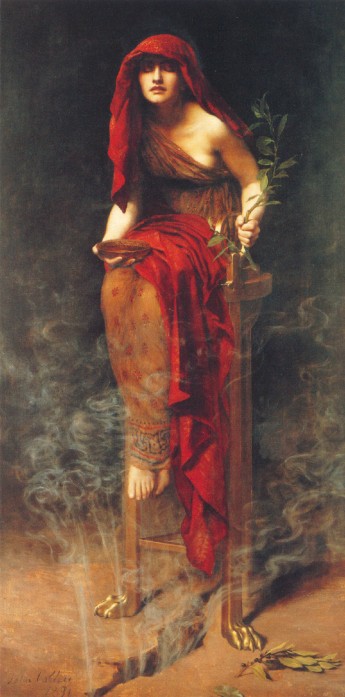Who was she?
Now, this is a tricky one. You might have noticed already that this page does not cover a specific individual, but a position held by many women over hundreds of years. I can explain. See, we don't actually know anything, and I really do mean anything about the individual priestesses. From what I can find, not a single name of a single oracle in over a thousand years survives.
The Pythia was the oracle at Delphi, sacred site of Apollo. She was the most trusted and revered oracle in the Greek world, of which there were many. Named for Python, the legendary snake slain by Apollo to found the temple, the name Delphi also references a myth where the god turned into a dolphin to bring some sailors to the settlement.
We know the site was already established at the very latest in the 8th century BCE. Pausinias attests the post goes back to the 11th century CE, but at least a shrine at Delphi may be as old as 1400BCE, which is, in layman's terms, crazy fucking old.
Part of the reason why we know so little about the minutae of the Pythia, like how the prophecies actually worked, what her life was like, etc, was because the institution was so widespread, so well known, that nobody in the ancient world bothered to write it down. I mean, would you think it's necessary to explain the concept of going to big Tesco in your diary?
The accounts we do have can vary, even contradict, but this isn't too suprising when you consider how long the oracle at Delphi operated for. At it's peak, three differnt women served as Pythia, and varying accounts may also be the result of personal difference in approach.
According to various ancient and mythic sources, the site was initially dedicated to Gaia. Whether there was an oracle during this time is uncertain. Various feminist scholars have posited the "male god slaying a giant snake" theme that pops up a few times in Indo-European mythos as a mythic allegory for male-based pantheons taking over historically female-centric sites and means of worship. However, like many things in ancient history, we cannot be certain.
In the early days of the Pythia, she was a young unmarried girl, symbolically dedicating her virginity to Apollo, but at some point she became over fifty, dressed as a virgin. Diodorus tells us that the common explanation for this is a guy called Echecrates the Thessalian, who 'fell in love' with the young priestess and kidnapped and raped her. After this sacriligious violation, the rules were changed and the Pythia became an older woman to discourage a reoccurance. Ancient historians are tenuous at best with sources, but we don't have much else to go on.
This was written around the 30's BCE (roughly around the death of Caesar), but there is an Echecrates the Thessalian known to us, which may help date this transformation. A military officer of Ptolemy IV of Egypt (Cleopatra's ancestor!) in the Fourth Syrian was around 220BCE, mentioned in Polybius' histories. Little is known about Echecrates outside of these two aspects, and if Diodorus' account is correct, this would put the elderly Pythia tradition at over 150 years old by then. Given what we know about ancient Greek misogyny, it is sadly easy to believe.
The Pythia could only be consulted one day each month for nine months of the year, and demand was high. Plutarch claims the prophecy sessions were very physically demanding and if the priestess' age was already advances (Plutarch was a priest at Delphi and born in 46 CE), this probably contributed to several premature deaths.
There were other, non-Pythia priests and priestesses and various cult officials around Delphi, but details about them and their operations are ever sparser than that of the Pythia. The onl;y named Pythias we have are mythic figures, such as Xenoclea in the legend of Heracles (Hercules for you Disney fans), and Phenomene, the legendary first Pythia and daughter of Apollo. As for the real women, nothing is known.
It seems that non-identity may have been part of the job. As virgins, the Pythias pledged themselves entirely to the service of Apollo, and as matrons they cut all marital ties, forsook all familial responsibilities, and devoted themselves in service. Perhaps this is intentional, though I cannot fully make myself believe these women retained nothing of themselves, emptied their souls in worship. Not all of them, and not for a thousand years straight. Somewhere, there is a Pythia crying out for us to remember her.
Like all elements of paganism, the Pythia declined after the Roman conversion to Christianity. Though it remained operational for a while, and the Pythian games continued until 424 CE, the temple itself was destroyed by Emperor Theodosius I in 391, and the position of Pythia is not believed to have endured beyond her temple.
What did she say?
Love of money and nothing else will ruin Sparta.
I know the number of the sand and the measure of the sea;
I understand the speech of the dumb and hear the voiceless.
The smell has come to my sense of a hard-shelled tortoise
being cooked with a lamb's flesh in a bronze pot:
bronze is the cauldron underneath, and bronze is the lid.
Now your statues are standing and pouring sweat. They shiver with dread. The black blood drips from the highest rooftops. They have seen the necessity of evil. Get out, get out of my sanctum and drown your spirits in woe.
The strength of bulls or lions cannot stop the foe. No, he will not leave off, I say, until he tears the city or the king limb from limb.
Your presence here outrages the god you seek. Go back, matricide! The number 73 marks the hour of your downfall!
Make your own nature, not the advice of others, your guide in life.
